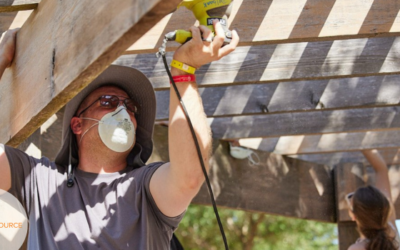This one-part Bible study looks at the spiritual practice of service and helps youth to notice the needs around them.
Topics: Servanthood, Spiritual Growth
Download a PDF of Bible Study: Spiritual Practices – Service
Main Take-Away Point & Scripture Focus:
- Luke 10:25-37
- Seeing the needs of others
Session Objectives:
For the participant to:
- Engage in attentive prayer and see him/herself in the place of the Good Samaritan.
- Walk through an experience in attempting to pay attention to needs around them within their close community.
Invitation into Conversation:
How do you feel about serving others? Is it easy or hard for you to get into? Why?
Information before Conversation:
Read: Luke 10:25-37 slowly together. Invite youth to listen to the story with their imaginations primed to see themselves in the story, either as a character or a bystander.
Investigate:
Ask: What stood out to you? Pretend you were the Levite or the Priest in the story. What are your concerns? Where are you going that you don’t take the time to stop? Are you in a hurry?
Now, imagine you’re the Samaritan. Why do you slow down and help out? How do you feel about using your money and time to help this guy out?
Read: (These are quotes from The Celebration of Discipline, Richard Foster).
Self-righteous service comes through human effort. It calculates immense amounts of energy calculating and scheming how to render the service…. True service comes from a relationship with the divine Other deep inside.
Self-righteous service is impressed with the “big deal.” It is concerned to make impressive gains on ecclesiastical scoreboards. It enjoys serving, especially when the service is titanic. True service finds it almost impossible to distinguish the small from the large service.
Self-righteous service requires external rewards…. True service rests contented in hiddenness. It does not fear the lights and blare of attention, but it does not seek them either.
Self-righteous service is highly concerned about the results. It eagerly waits to see if the person served will reciprocate in kind. It becomes bitter when the results fall below expectations. True service is free of the need to calculate results. It delights only in the service. It can serve enemies as freely as friends.
Self-righteous service picks and chooses whom to serve…. True service is indiscriminate in its ministry.
What do you think this guy is trying to say with these statements? Do you agree or disagree? How come? What do these statements have to say about our youth ministry and servant events?
[Here, encourage your youth that our lifestyle of service and love is something that God generates within us and calls us into. We hear again and again that important message that we are Gods forgiven and loved children, marked with His baptismal promise. And now in freedom, God is calling us into a new life of loving God and loving others.]
Illustrate: (Participants Illustrate the Concept)
Ask: What do you think the point of Christian service is? Why do we serve? Why should we serve?
Inspire: (Participants Place Something Into Lifestyle Action)
Head out into your community. Select an area and walk the streets together. You could choose to split your group into small groups of 5-6 youth or could go as a larger crew. The point is to be looking for opportunities to serve. You might have to knock on a few doors to learn about any needs in the area. Work with whatever you discover. Your project on this first night might only be an awareness of something you as a group could tackle the next week. Or you might just get to serve whomever you bump into that night.
The goal of this activity is to practice getting involved in other peoples lives, asking them if there’s anything you could do for them, or for someone they might know. Its an exercise in attentiveness, focusing on others, and being just a bit uncomfortable in learning how to get involved.
Conclusion/Wrap-Up:
Dialog about the night. What was hard? What was expected? Unexpected?
Finish the evening with this Scripture section and a closing prayer together:
“This is the kind of fast day I’m after:
to break the chains of injustice,
get rid of exploitation in the workplace,
free the oppressed,
cancel debts.
What I’m interested in seeing you do is:
sharing your food with the hungry,
inviting the homeless poor into your homes,
putting clothes on the shivering ill-clad,
being available to your own families.” (Isaiah 58:6-7, The Message)





0 Comments